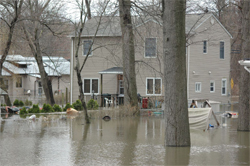According to a survey by Bankrate.com, 81% of Vero Beach homeowners know that a standard homeowners insurance policy doesn't cover flood damage, but a separate survey by the Insurance Information Institute found that only 13% of Vero Beach homeowners had a flood insurance policy.
to a survey by Bankrate.com, 81% of Vero Beach homeowners know that a standard homeowners insurance policy doesn't cover flood damage, but a separate survey by the Insurance Information Institute found that only 13% of Vero Beach homeowners had a flood insurance policy.
The Federal Emergency Management Agency (FEMA) and its National Flood Insurance Program (NFIP) identify flooding as the United States’ No. 1 natural hazard.
Princeton Survey Research Associates International surveyed 1,003 U.S. adults, on behalf of Bankrate.com. The telephone survey was fielded from April 4 to 7, 2013. The survey responses were weighted by gender, age, education, race, Hispanic origin, region, and telephone status. Interviews were conducted by landline and cell phone.
Based on a Researchscape assessment of the questionnaire and methodology, this survey is moderately likely to be representative of U.S. consumers in general. The awareness question is a leading question that may overstate actual understanding that flood insurance is not included in homeowners insurance.
In a prepared statement, Michael Barry, spokesman for the Insurance Information Institute, an industry trade group, said "I was very happy that 4 out of 5 survey respondents understood that standard homeowners insurance does not cover flood. This number is a much higher awareness level than we've seen in the past."
FEMA usually classifies properties as either high flood risks or low-to-moderate flood risks. Bankrate.com asked Vero Beach homeowners whether or not they know the correct classification for their home and only 51% said they know the correct risk category.
Statistics show that recognizing the need for separate flood insurance does not always lead homeowners to purchase it. An Insurance Information Institute poll last year found that the number of American households with flood insurance actually decreased from 17 percent in 2008 to 13 percent in 2012.
Amy Bach, executive director of United Policyholders, a San Francisco-based non-profit advocacy group for insurance consumers, says some homeowners get lured by history into a false sense of security. "People have this notion that if it hasn't flooded in the past, it's not going to flood," she says. "While I can understand that thinking, I wouldn't trust it anymore because of Sandy and all the talk about climate change. If you live near a body of water, it behooves you not to use the past as your only decision point."
Vero Beach homeowners are urged to study their local flood map carefully to make an informed decision. The best place to start? The NFIP's user-friendly consumer site, FloodSmart.gov.
For more information concerning insurance, check out our other articles about Vero Beach Insurance to your right under the Vero Beach Real Estate Categories.

